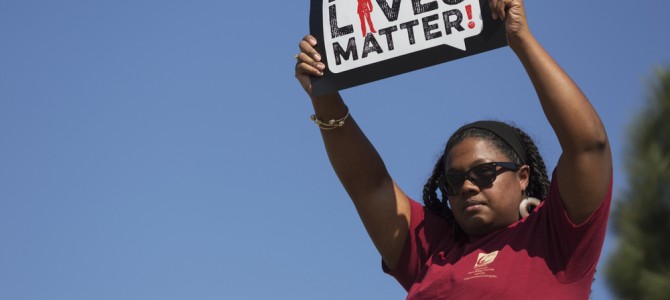
Race protestors have presented a list of demands at universities across the nation, demanding an “end to systemic and structural racism on campus.” The problem here isn’t just the demands, which resemble something born of a Progressive wet dream, but the premise—and as long as white people accept that premise, they have only themselves to blame for future racial conflicts.
The presumption of institutionalized racism has become an indisputable creed of the Left, but most of the evidence presented doesn’t prove racism at all. Whether it’s housing, arrest statistics, or college acceptance and hiring, inequality of outcome does not equal racism, and to assume it does is to ignore the various complexities of the black community that have nothing to do with white oppression or privilege.
Yet white (and black) Americans accept this premise—the belief that our country’s institutions are fundamentally bigoted. This deferential capitulation to a false narrative has created and encouraged racial strife in our nation, and it will continue as long as white people allow white guilt to color the truth. This white guilt is a form of self-redemption in which whites create policy and engage in actions to prove they’re innocent of racism.
Give Us Your Stuff, You Bigots
Just look at the protestors’ demands: They include higher rates of college admission for black students, hiring more black faculty, more authority given to black faculty and administrators, free education for poor black students, and “divestment from prisons and investments in communities,” i.e., wealth redistribution. In other words, this has nothing to do with “systemic racism” and everything to do with advancing a “black power” agenda.
Protestors are using threats, intimidation, and manipulation of white guilt to get what they want, and they’re succeeding because white people are playing right into their hands. They don’t want to appear to perpetrate white supremacy, and they desperately want to reestablish the legitimacy of America’s institutions by proving they’re not racists, so they bow to the demands of the intimidators. This has only fueled more conflict, and whites have only themselves to blame.
Shelby Steele, an African-American author and a research fellow at Stanford University’s Hoover Institution, makes this point in his 2006 book “White Guilt,” a must-read for anyone trying to understand racial conflict in our country today. Steele explains that racism continues in America, not because there is actual global racism, but because of white guilt.
White guilt is not just a feeling of misplaced guilt, but whites accepting they are guilty of racism and therefore having to continually prove they’re not. This, of course, is an impossible task, because you can never prove a negative.
White Guilt Equals Black Power
In “White Guilt,” Steele makes the following observation:
When I visit university campuses today, black students often tell me that racism is everywhere around them, that the university is a racist institution. When I ask for specific examples of racist events or acts of discrimination, I invariably get nothing at all or references to some small slight that requires the most labored interpretation to be seen as racist. Global racism allows these students to feel aggrieved by racism even as they live on campuses notorious for almost totalitarian regimes of political correctness—and to feel more aggrieved than black students did forty years ago, before the civil rights victories.
This is because their feeling of racial aggrievement is calibrated to the degree of white guilt on university campuses and not to actual racism. When I ask if they feel racially aggrieved away from campus at their summer jobs, they often look surprised, as if the question is not relevant. But then most say they don’t see as much racism at their summer jobs.
Global racism prevails precisely where whites and institutions most aggressively search for moral authority around race. Even announcements of a new commitment to ‘diversity’ within an institution will very likely increase feelings of racial aggrievement in minorities.
We blacks always experience white guilt as an incentive, almost a command, to somehow exhibit racial woundedness and animus.
This last statement is a powerful indictment of race-baiting blacks who demand redress for perceived racism, but it makes sense. The more whites act as if they’re guilty of racism, the more opportunistic blacks (and liberal elites) will use that “guilt” to gain power by manipulating the system to get what they want—free education, affirmative action, more “equality” in hiring (i.e., more minorities being selected, not based on merit, but on the color of their skin).
An Agenda of Power
The campus uprisings today have less to do with perceived racism and more to do with promoting an agenda of power. This is evident from the protestors’ list of demands. The strategy is to use white guilt and political correctness to achieve goals that are not so easily attained through legitimate means.
This agenda, combined with students who are easily offended, creates a powder keg of strife. The spotlight is on overcoming “racism,” but the real agenda has nothing to do with actual racism. The goal is to advance black power in the name of social justice and bring about opportunity, not through personal responsibility, but through intimidation and threats.
The only way to push against this agenda is to reject the very notion of white guilt and to refuse to give in to politically correct control. The more America’s institutions yield to the notion that they’re racist, the more race-baiters with an agenda will acquire power and control. When that happens, freedom in America will be lost.








